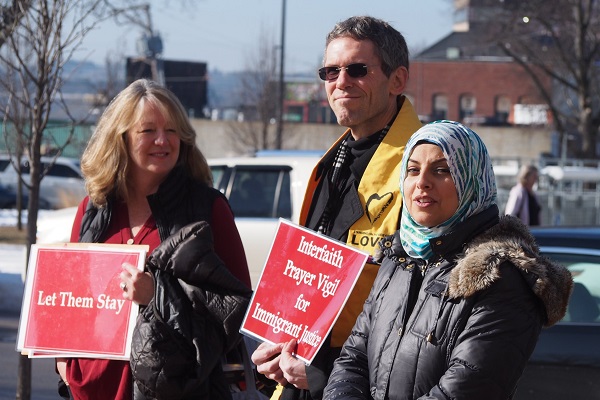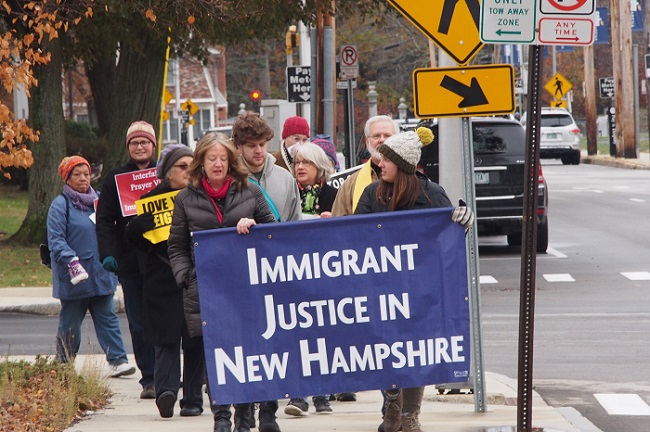
Maggie Fogarty is the co-director of AFSC’s New Hampshire Program. Her work includes organizing, coalition-building, and advocacy for immigrant rights, affordable housing, tenant and worker rights, and ending homelessness. Read part one of her interview here
Sophia: How does your social change work and Quaker faith connect? Do you see social change work being a key component of Quakerism?
Maggie: Yes, for me the connections are so clear; the work for social change arises from our shared values as Quakers, in particular our deep belief that there is that of God in all of us. We are compelled to live and act in such a way as to bear witness to that truth, to live as if we truly believe it. And that means making change, pure and simple. The conditions within which so many of our people live cry out for change, not in the next life, but in this one.
I want to say, however, that when I encounter Quakers for whom the spiritual life does not lead directly into action for social change, I do have a sense that there is something there I need to pay attention to…. That I need to pause, to hold my ideas and my plans more loosely and with greater humility, and to remind myself not to be so certain. It is an invitation to tease apart my activism from my spiritual path, and how the Spirit is speaking, not just in my own heart, but through my community and way beyond us.
There are many teachers in my Quaker family, and those whose spirituality and its practical implications are different from my own offer an opportunity for me to remember that the truth that I can see is always only ever a part of the larger whole. I truly believe that a faith life centered in community can continue to break us open to new possibilities and new understandings.
Quaker teaching about the undeniable dignity of the person is the underpinning for the social justice work that I do, even if I am an imperfect messenger of it. It’s what I feel accountable to, regardless of what issues we are working on. For many years, the AFSC New Hampshire program had a priority focus on affordable housing and ending homelessness.
Over the years, we have also organized campaigns to make sure that our state budgets invest in health care and education, and we organize to raise wages and to defend the rights of state employees to collectively bargain for fair wages and benefits. We have been part of a long-term effort to abolish the death penalty. Our areas of focus can shift, depending on the opportunities and the urgencies that emerge, but we have history in all of these areas of work and they are interconnected. All of this work relates to this fundamental belief in human dignity and human worth.
Working from that belief -- of human dignity -- affects not just what we do, but how we do it. How do we characterize our opponents in any given struggle? What narrative are we lifting up? What are the implications of the values we express, even if they take us beyond the current confines of what is politically expedient or possible?

AFSC, throughout the world, has built a reputation for integrity and moral clarity. People trust us, and they know that our analysis can be trusted because we’re centering ourselves in the testimonies of equality, justice, community….
I have noticed sometimes among Quakers that this commitment to human dignity can be interpreted as guidance that we shouldn’t engage in conflict, or express anger; we can’t create tension; we can’t be acting in a way that takes sides. That does not align with what I have learned from Quaker stories. I believe we are called to all of it – anger, tension, conflict for the sake of disrupting the current order – all while honoring the humanity of everyone involved in that particular struggle. I’ve seen it done and it’s a powerful witness to truth. When we avoid conflict, really, we avoid working for social justice. There’s no way we’re going to get where we need to go without building the tension and standing for and standing against.
Sophia: What is your vision for a just world and what is needed for us to get there?
Maggie: A just world is a world that values community, and that of God within every person. The person is the bearer of the divine Light. We are most fully ourselves to the extent that we are committed to community that is fair and abundant and safe for everyone, and that honors different voices. A just world is a world in which we, individually and collectively, have opportunity and choices, and creativity that is celebrated, and where we feel powerful, individually and together. I think we get there by valuing relationships built on compassion and truth.
In the movement-building work that we do in New Hampshire, we know that if people feel welcomed, meet other people, enjoy themselves, learn something, and feel like their own wisdom is affirmed, then they’ll keep coming back. They’ll come back for bigger things, and they’ll bring their own creativity so that they’re shaping and nurturing the work that we are doing together. This work has to value and center relationships; that is where we will experience the abundance that we need to make transformational change. Of course, we need strategy and messaging and other capacities, but first and foremost, we have to honor and invite the people in order to build a movement.
And our movement needs to bring about dramatic structural changes, so that the rights and well-being of all people are protected by laws, nurtured by public investments in the common good and what is needed for a dignified life – good housing, excellent education, health care, good jobs. To bring this about, we need to be involved in policy advocacy and the kinds of education and outreach that builds the will to invest in each other’s well-being. We have to build a shared understanding that we are truly all in this together, that we need each other, that we are one.